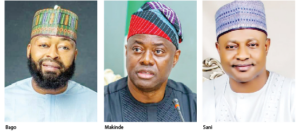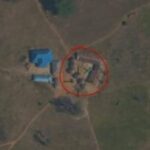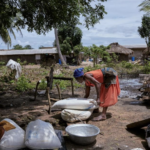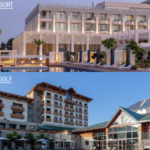In a number of states, there are sentiments that voters in urban and metropolitan cities don’t align with those living in the hinterlands, mostly farming communities, when it comes supporting political parties and governorship candidates.
And the reasons vary, from historical rivalries between two divergent societies to tribal affinities or simply the natural bias and prejudice people living in rural areas and those in cities have towards one another.
These contradictions are particularly heightened in a number of states because of the insecurity that has mostly affected farming communities in the rural areas, who have been left without any means of livelihood.
Yet, historical precedents matter. In Kaduna, voters once favoured politicians from small towns, but in recent elections, they have voted for candidates representing Zaria, while in Katsina, voters have only once rewarded a governorship candidate from a big city.

The contrast is particularly pronounced in states like Oyo where voters Ibadan, one of the biggest cities in the country, can single-handedly determine who becomes governor regardless of how other regions in the states votes.
The opposite is true in states like Niger where most votes come from the hundreds of villages and small towns, though allegations have been made that these are the areas where rigging is easy.
The governorship candidate of the All Progressives Congress (APC), Hon Umar Mohammed Bago and that of the Peoples Democratic Party (PDP) Alh Isa Liman Kantigi have accelerated their campaign in both rural and urban areas.
Both candidates are from Niger south, which is zone A and has the largest voting population is the state.
The assumption is that Bago is said to be popular in the urban area considering his political base in the Chanchaga federal constituency of the state capital that he has represented for four consecutive terms and his traditional base, Bida.
Kantigi, on the other hand, claims popularity as a rural man who grew up in rural areas and understands the dynamics and the suffering of rural dwellers.
The natural strength of the two candidates is presumed an added advantage to their pursuit. For instance, Chanchaga and Bida local government areas are seen as the strongholds of the APC candidate where the votes are always in lump sum.
He is seen as a cosmopolitan politician who is well-grounded in the two most populous cities in the state.
Whereas, the PDP candidate is seen as popular in the homogenous Nupe-speaking rural communities of the Edati/Lavun/Mokwa federal constituency that used to produce votes for the party in the state, the candidate is significantly making inroads into Niger south.
In Niger east, the voters are not heterogeneous but the presence of the political structure of Bago at the state capital, Minna, has produced close to 100,000 votes at every election, maybe an advantage.
Similarly, the Suleja axis which is another metropolitan area, may also determine the winner, with PDP having a significant chance because of the running mate of the PDP candidate, Samuel Gomina; who is from Tafa a suburb of Suleja.
In the same vein, the running mate of Bago, Comrade Yakubu Garba from Shiroro axis, enjoys a lot of popularity among the youth making the zone a battle ground with APC having an edge.
Niger north is the most unpredictable zone politically where the PDP candidate has recently shifted ground to the rural areas with the APC following up last week.
The special adviser to the governor on political and strategy, Alh Mohammed Nma Kolo told LEADERSHIP Sunday that a large number of the electorate see Bago as a symbol of hope.
He said the governorship candidate of the APC has for a long time shown the youth empathy by empowering them irrespective of where they come from saying that would work in his favour.
“Bago’s candidacy is a mass movement; many will vote for him. He has supported young Nigerlites and they will demonstrate that love at the election,” he said.
To the former governor of Niger State, Dr Muazu Babangida Aliyu, who is currently the leader of the PDP in the state, and gathered the party stalwarts last week for a dinner in what he referred to as a pre-presidential campaign rally in the state, “the time to galvanise support for all PDP candidates to take power from the APC is now.”
He did not mince words about the desire of the party to leverage on the visibility and cohesion of the party at the grassroots to reclaim power.
The former governor said the party has done well for the state and the country, to the extent that the people especially those in the rural areas who benefitted so much under the party’s administration can now retrace their steps to vote massively for the party.
He said, “It is a test. The PDP was doing well but we called for change. God gives you leaders the people deserve. If you are good, they give you a good leader and if you pray for good, God will give you.”
Oyo Governorship Race, Not Business As Usual
In the next few weeks, the electoral process of electing another executive governor, who is exepected to occupy the Agodi Government House will commrnce with 14 other governorship candidates trying to become the next tenant.
The governorship candidates and the political parties slugging it out with the incumbent governor, Seyi Makinde for the coveted governorship seat, include 15 persons.
The list of the governorship candidates published included state governor, Seyi Makinde, who is running for a second term in office on the platform of the PDP; Folarin Teslim of the APC and Popoola Joshua of the New Nigeria Peoples Party (NNPP).
There is no doubt that the March 11 election is surely a knotty and a very hard nut to crack in the state due to the changing dynamics of what’s hitherto known of Oyo politics.
A businessman living in Ibadan, Joseph Ajala, said the governor should be allowed to go for a second term to enable him complete most of his projects to enhance the deveopment of the state.
According to him, the governor has done well in the areas of infrastructure, education, health and human power development, to enable him run for second term.
He argued that the saying that Ibadan people don’t vote one governor twice should be discarded, especially when the jinx had been broken by the immediate past governor of the state, the late Sen Abiola Ajimobi.
Another resident, Adewale Sadiq, a trader said since the govermor failed in the area of security, he does not deserve a second term.
Sadiq who noted that businesses could not thrive in a situation where there is no peace, said the governor had failed to secure the lives of the people.
A public affairs analyst, Oladele Ogunsola noted that in the last dispensations, the state had three former governors of the state: the late Sen Abiola Ajimobi (2011-2019), the late Chief Adebayo Alao-Akala (2007-2011) and the present Otun Olubadan of Ibadanland, Sen Rashidi Ladoja (2003-2007), influencing politics in the state.
According to him, while both Ladoja and the late Ajimobi held sway in Ibadan, the late Alao-Akala’s base was Ogbomoso.
He said Ibadan alone, consisting of 11 local governments of the 33 LGs in the state, accounts for almost 60 percent of the state’s total votes and Ogbomoso with five LGs comes next. Oyo zone has four LGs as against Oke-Ogun’s 10 and Ibarapa’s three.
“So, it used to be very easy to predict where the votes would go. While both Ladoja and the late Ajimobi would always share Ibadan votes, the late Alao-Akala had Ogbomoso’s in his grip.
“As at today, two of them are no more and the only surviving of the trio, High Chief Ladoja had said sometime ago that he had quit active politics. The implication of that is, he cannot be counted as a card-carrying member of any political party as his imprints are traceable to some of the choices of who picked what to contest for in some of the political parties in the state.
“Thus, it would be foolhardy to expect such a leader to command the kind of political/voting followership he had in 2019 or before. So, with the demise of both Ajimobi and Akala, who would their supporters run to for voting guidance during the election?
“Thus, to declare the people as being free to make their choices in the election is not misplaced,” he said.
Having said that, the politics being played by the incumbent governor, Seyi Makinde of the PDP, is very difficult to analyse.
With his stance and membership of the ‘G5 Governors’, the core and established PDP members are not seeing him as a ‘member of the PDP’ and coupled with his strained relationship with some of the party leaders, their commitment to his re-election bid is almost nil.
And should the APC win the presidential election which would hold two weeks ahead of the gubernatorial election, things would be more difficult for him.
The allegiance of such leaders and their followers may not be difficult to shift to the APC gubernatorial candidate, Sen Folarin, who is seen and counted as one of them.
The third-term senator had his first two terms as a PDP member. With such support, one would say he would be home and dry as the next governor, but, it won’t be that easy too.
As noted earlier, Ibadan with 11 LGs holds the ace as it determines where the pendulum swings. The whole votes to be garnered in the entire 10 LGs of Oke-Ogun area cannot match the votes of Ibadan South-West, one of the 11 local government areas in Ibadan.
So, except for constitutional spread, Ibadan voters alone can make a candidate governor. So, the election, which is the first to be conducted after the demise of two of the political tripod (Ladoja, Alao-Akala and Ajimobi) would be decided by how much of Ibadan votes one can garner in addition to the level of acceptability in other parts of the state. But, one thing is certain, the election would not be a business as usual.
Will Winning Votes In Kaduna State Come From The Urban Or Rural Centres?
In Kaduna, winning votes in past elections normally come from the rural areas as most permanent voter’s cards (PVCs) holders in the cities rarely show any commitment or come out to vote on election days and politicians tend to concentrate more in rural areas, directly or indirectly buying their votes.
From the return to democracy in 1999, most of the determining votes that produced winners come from the Southern Kaduna and Kaduna North Senatorial districts because those areas tend to show more commitment and often willingly come out to cast their votes on election days.
Both zones make up the large part of the rural, pastoral and farming areas of the state.
With the exception of Patrick Yakowa, who became governor of the state after Namadi Sambo was picked as vice president, all other governors of the state have emerged from the northern senatorial zone of the state. And in the past, the governors like Dabo Lere and Ahmad Makarfi came from less recognizable towns.
But since Namadi Sambo, a native of Zaria, the ancient and most cosmopolitan city in the northern senatorial zone, was elected governor back in 2007 and since then, the zone has always determined where successive governors come from.
This time around, the contest for the governorship is essentially between two candidates who represent this gulf between the sentiment of voters in cities like Kaduna and Zaria on one hand, and the smaller, but politically relevant towns and villages on the other.
The governorship candidate of the PDP, Isah Ashiru, was born and raised in Kudan, a local government in the northern senatorial district and represented Kudan/Makarfi federal constituency in the House of Representatives between 2007 and 2015.
The APC candidate, Senator Uba Sani, basically represents Kaduna city in the senate.
Some of the would-be voters also speak on what should be expected during the elections. A political analyst, Bala Abdulkareem, believed that “so many things will determine this election because I have never seen people coming out to register and queueing to collect their PVCs like it is now.
“This means people are now determined to vote. In the cities, it will not be the relative low turnout that we used to experience. It appears there is a reawakening. So, for me, we should expect large turnout of voters in the urban areas.
“Secondly, the large results that used to be achieved in the rural areas are rarely the real votes because of rigging, but with the introduction of electronic voting, that will be very difficult this time around. Again, most of these villages that were attacked, you cannot expect to see much votes from there because many of the voters were killed, and gone are the days when even dead people were captured to have voted.
“With the electronic voting and the use of PVCs, it will be difficult. Lastly, the insecurity affects most of the rural areas, so they may not turn out enmass to vote.”
Special adviser on Media and Public Affairs to the Kaduna State PDP chairman, Edward John Auta said, “what I think is that there is a very serious voter consciousness in both the rural areas and urban centres and there is an increased interest among the electorate in this 2023 election.
“The urban centres tend to have more voters based on the released registration of voters; you will see that the urban local governments have more voters’ concentration than the rural areas.
“The largest number of voters are from Chikun, Igabi, Kaduna North, Kaduna South, Zaria and Jema’a local governments and by the registration, voters from these local governments alone account for more that 50 percent of the total registered voters in the state. So, if there is more interest from the urban dwellers, it means they are going to determine who becomes what in this 2023 elections.”
Why Katsina Governor May Emerge From Outskirt Town
As the battle for the soul of Katsina State continues to gather momentum, evidence shows that the governorship seat would still come from towns on outskirts of the state.
Already, the candidates of the PDP, Sen Yakubu Lado, and that of the ruling APC, Dr Umar Dikko Radda are tipped as favourites to win the 2023 governorship election and to replace Gov Aminu Bello Masari.
And interestingly, both candidates have similar antecedents and come from smaller cities of Danmarke in Kankara LGA and Radda village in Charanchi LGA respectively.
Historically, Katsina State has a geographical and political expression of an area that encompasses two ancient kingdoms of Katsina and Daura, which are among the oldest Hausa States that formed the foundation of Hausaland. The people largely depend on farming, traditional handicrafts and animal husbandry.
Since the creation of the state, the late Umaru Musa Yar’Adua was the only candidate from the main metropolitan city to govern the state. That is from 1999, when he served two tenures before he became the President of Nigeria in 2007 and later died while in active service.
A political analyst in the state, Shehu Abubakar Mani, said one of the reasons the state always has governors from outside the main cities may be out of the political experiences of politicians.
He added that the political actors that have been in the field for long always utilise the opportunity by aspiring for the governorship seat and in most cases occupy the seat.
He said, “I can give you an example when the late Umaru Musa Yar’Adua came into politics. He had been a member of PRP, a lecturer for a long time and acquainted himself with a lot of its students. So, he got a lot of his support from the academia.
“For those from outskirt cities like former Gov Shehu Shema, he has been with the political class for a long time like the late AmbMagaji Muhammadu who has been his mentor. He has been a commissioner, and when that opportunity came, people knew him already and he had an easy slot for the seat.”
He added that Gov Masari who also came from an outskirt town has a similar record of being in the political spectrum, which also helped to win the governorship seat in 2015 and 2019.






